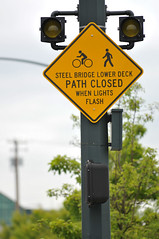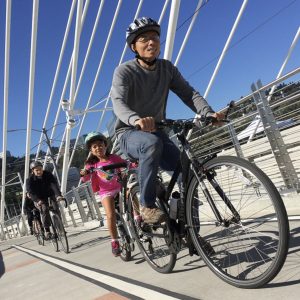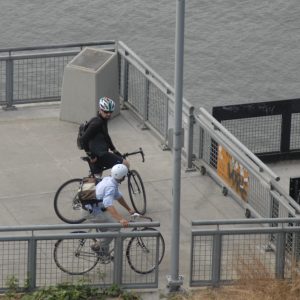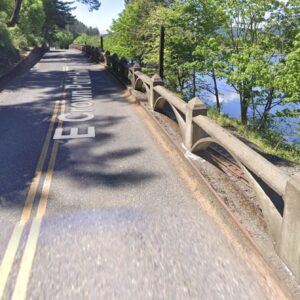The Portland Bureau of Transportation has installed new signs to warn people when the lower deck of the Steel Bridge is closed. The signs, placed on North Interstate Avenue and near the bike-only signal above the Esplanade, are due to become operational next week.
The signs are cautionary orange, have flashing beacons on either side, include the bike and walk symbol and have the words, “Steel Bridge lower deck path closed when lights flash.”
Here’s how PBOT spokesman Dan Anderson explains how they’ll work:
“The signs will flash whenever the gates are closed on the lower deck path, no matter what the reason. They will flash when the lower deck is lifted for river traffic as well as when there is a closure for maintenance, or if there are any further malfunctions of the gates.”
“We hope it saves people time and reduces the level of frustration many feel when they get to the crossing only to find it closed.”
— Dan Anderson, PBOT
Last summer, the gates on the Steel Bridge path malfunctioned several times. I asked Anderson if these signs were a response to those problems.
“The mechanical and electrical issues on the 99-year-old Steel Bridge’s lower deck gates remain an issue,” he replied, “although these incidents have been greatly reduced. Whether they are closed for a bridge lift, maintenance or malfunctioning doesn’t matter to someone who cannot cross the river as planned.”
So far, two signs have been installed. Anderson says the locations were chosen to “address places where travelers are above the bridge and can’t easily see that the lower deck path is closed, but would have the option to use the upper deck sidewalks if they are informed.” (See a contextual view of one on Interstate in this photo).
“We hope it saves people time and reduces the level of frustration many feel when they get to the crossing only to find it closed.”
At this point, the new signs are a pilot project, but Anderson says the detector/transmitter hardware that’s already been installed on the bridge will allow them to easily add more signs as future funding, or demand, allows. The signs were paid for through the City’s “Keep Portland Moving” project.








Thanks for reading.
BikePortland has served this community with independent community journalism since 2005. We rely on subscriptions from readers like you to survive. Your financial support is vital in keeping this valuable resource alive and well.
Please subscribe today to strengthen and expand our work.
Nice. I wonder how many people will alter their route when the bridge is closed (vice just waiting)?
This is a great idea! I’d love to see the same treatment at Vancouver & Russell, as this is where most north-to-Central City-bound bike traffic makes their decision about Broadway Bridge versus Steel Bridge.
This is FANTASTIC! Brilliant. Thanks Dan and the rest of PBOT!
Wait, PBOT suggests using the upper deck SIDEWALKS if the lower deck is closed? It’s legal and arguably safer (not to mention fun!) to take the lane.
That’s a good catch Erinne and it raises an interesting point. My hunch is that PBOT is uncomfortable telling people to take the lane due to safety concerns, yet it is actually the legal thing to do. The sidewalks aren’t wide enough to legally allow bikers and walkers to mix. Technically, people on bikes should walk on the sidewalk. hmmm
what legal citation are you referencing, Jonathan? (width of sidewalk determines whether people on bikes and people on foot can mix or not?)
yes.. something like that. It might actually be more of a planning statute… wherein there are specific federal guidelines that say a public path must be of a certain width to be technically considered a path that can be shared. This came up with St. Johns Bridge, which has sidewalks too narrow for bike/walk traffic. It’s the type of thing that, if a collision occurred, a lawyer could point out.. “Well, this facility isn’t even wide enough to facilitate biking and walking side by side, therefore..”
I don’t think that’s true, Erinne. It is perfectly legal to use those sidewalks until you get into the downtown zone where it is prohibited.
YES, it is fine to take the lane also. –and there is actually a sign on the upper deck that warns motorists of Bicycles on Bridge Deck.
Not saying it’s illegal, just not best practice.
understood and agreed.
There’s also the issue of slippery metal plates, not that we’ll have to deal with that for the next few months (knock on wood, toes crossed, &etc).
Brilliant. Thanks, PBOT.
WRT to the recommendation of using the upder desk’s sidewalks. Yeah, bad advice. But since the advisory sign doesn’t say it, it’s mostly advice that (thankfully) will go unheard.
After reading the article more carefully, it’s not even an recommendation to use the sidewalks. It was more casually mentioned:
So I don’t hold them to it.
This is the Beginning of the END!!!
Soon there will be signage, traffic control devices and rational drivers ALL OVER PORTLAND! We will no longer have any ethical or practical reason to ignore traffic laws as they suit us on a daily basis! We must stand against this un-hipsterization of bicycle traffic! I demand the right to blow through traffic lights and cut through parking lots to avoid whatever inconveniences me!
/s
In all seriousness: any use of standardized road signage for cycle traffic both validates bicycle traffic in the eyes of non-cycling motorists and will make it easier and safer for them to take up cycling themselves because the instructions are up on signs in an easily recognizable format.
+5 PBOT!
It would be nice if there was a way to differentiate between lifts (a few minutes) and closures.
This is my thought exactly. The distance between the sign on interstate and the pedestrian path is far enough that if the gate was closed to let a barge through, the gate would be open by the time someone gets to the pedestrian gate.
It’s the little things, PBOT! Thx